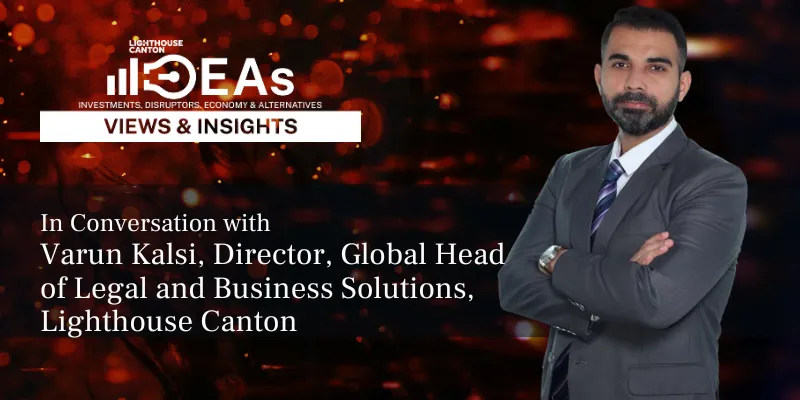
The Variable Capital Company (VCC) structure, suitable for all types of investment funds in Singapore, has gained popularity since its launch. Lighthouse Canton offers the VCC structure as part of its multifamily office solutions. Despite its presence for almost four years, many aspects of the VCC remain underappreciated. Here, we explore five such features
The VCC structure’s introduction in Singapore has been a game changer for the fund management industry in Singapore and yet many aspects are not fully known. LC IDEAS: Views & Insights sat down with Varun Kalsi Global Head of Legal and Business Solutions at Lighthouse Canton to bring forward these little known facts about the VCC structure:
1. AUM requirements for 13O/13U incentives
“On its own, a VCC might not seem that attractive. However, when combined with a licensed fund manager under Section 13O for Singapore resident funds, or 13U for non-resident and resident funds , the advantages become clear”, said Kalsi.
Initially, the 13O scheme included a grace period for meeting the minimum AUM requirement, but this has since been removed. Now, a single family office must have at least S$20 million in AUM on day one to qualify. However, for funds managed by Singapore licensed fund managers or multifamily offices, there is no stipulated minimum AUM threshold under the 13O or 13U schemes.
“Although there is no explicit minimum AUM threshold for licensed fund managers or multifamily offices, the MAS’s annual review process ensures that these entities maintain robust operational standards and continue to bring in significant funds. This regulatory oversight helps maintain the integrity and attractiveness of Singapore’s fund management sector,” noted Kalsi.
Families also get significant advantages of getting attached to licensed fund managers such as Lighthouse Canton to get access to established infrastructures, compliance frameworks, and administrative support, reducing the individual burden on single-family offices and allowing for more effective fund management and growth.
2. The essence of VCC’s umbrella structure
An umbrella structure is a key feature for VCCs, as detailed in Section 29 of the VCC Act, a crucial yet often overlooked provision. According to Kalsi, "Section 29 ensures that the assets and liabilities of sub-funds do not commingle, providing a critical assurance of independence and protection to investors."
This means Lighthouse Canton confidently assures prospects or clients that their sub-funds under the umbrella structure remain distinct and separate, with no risk of cross-contamination.
In an umbrella VCC, each sub-fund operates independently within the four concerns of the PPM and the investment strategy therein, and the investment manager cannot influence the segregation of assets.
Kalsi further explained, "The segregation of assets and liabilities is a cornerstone of the VCC framework, guaranteeing that the financial integrity of one sub-fund does not impact another."
This structural feature is a significant advantage for clients, offering enhanced protection and operational clarity within the VCC.
3. Two types of shares under VCC:
Another key aspect to understand about VCCs is the issuance of two types of shares.
According to Kalsi, "Management shares are held exclusively at the umbrella level by the investment manager, such as Lighthouse."
These shares confer voting and management rights, allowing the fund manager to operate under a discretionary mandate as stipulated by the MAS (Monetary Authority of Singapore).
The second type, participatory shares, are issued concerning the fund to the investor therein, typically an entity.
Kalsi noted, "Participatory shares represent the investor's holdings but do not confer voting rights."
"The fund manager retains full discretion over investment decisions concerning the fund, thereby ensuring alignment with MAS guidelines," Kalsi explained.
This structure ensures that investment decisions are centrally managed while providing clear value representation for investors.
4. Types of investments under the VCC
When it comes to the types of investments a VCC can hold, they have considerable flexibility.
According to Kalsi, "You can invest through a VCC in private and public markets across the globe. However, the section 13 tax benefit will only be available for designated investments in terms of the section 13 income tax benefit, which excludes Singapore real estate, Singapore REITs, and digital assets."
It is worth noting that investors can be entities as well as individuals.
The reason for these exclusions is tied to Section 13O/U of the (Singapore) Income Tax Act, which provides income tax exemptions for certain designated investments and income therefrom. These exemptions do not apply to the excluded asset classes.
Kalsi explained, "While you could arguably hold assets that are not designated investments within a VCC, the income derived from these assets will not be tax-exempt under Section 13."
5. Investment assets versus operating business under VCC
Another crucial point to highlight is the MAS clarification regarding VCCs with section 13 income tax exemption holding operating businesses. Initially, there was no such restriction, thus, consolidation of holdings in operating companies was a non-issue.
Kalsi explained, "The MAS has now clarified that VCCs should primarily hold investment assets and not operating businesses, which can be held still but subject to certain conditionalities."
Kalsi noted that "amongst some other conditionalities, a VCC can hold up to a 25% stake in an operating business if there is a clear liquidity horizon, such as a private equity stake. Furthermore, even if the cumulative holdings in operating businesses are below 25%, these cannot exceed 50% of the AUM." This ensures that the VCC remains primarily an investment vehicle and not an operating company.
A VCC shall make annual declarations to the MAS on its compliance with the section 13 conditions and the MAS reviews these exemptions accordingly to ensure compliance with Section 13 thresholds, including minimum spending and other criteria .
In terms of investment jurisdictions, VCCs are versatile and can invest globally, including in the US and UK. This global reach, combined with specific regulatory compliance, makes VCCs a powerful tool for structured, tax-efficient investments.
Kalsi emphasised, "The flexibility of VCCs, combined with regulatory compliance, makes them a robust tool for structured, tax-efficient investments, but they must primarily hold investment assets and not exceed the specified limits for operating business holdings."














.png)
%20(9).webp)
.webp)
